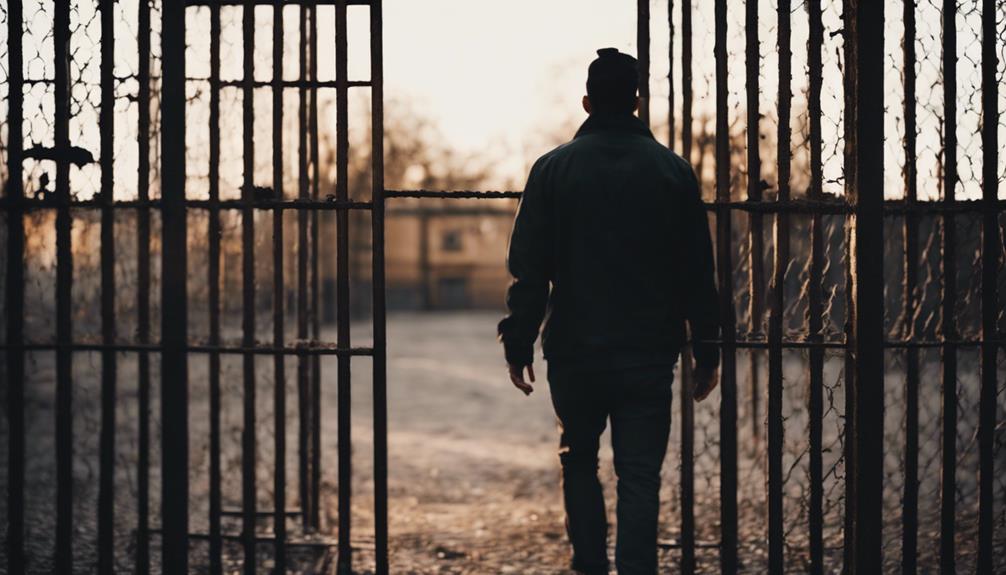Victims of narcissistic abuse have the option to pursue criminal charges, which could result in the perpetrators facing jail time. Behaviors such as assault, harassment, and stalking can lead to imprisonment for those who engage in them. It is crucial for victims to seek legal guidance to comprehend their rights and ensure abusers are held responsible. However, proving narcissistic abuse in a court of law can be difficult due to its secretive nature. Thorough documentation, which includes messages and witness statements, is essential in constructing a solid case. Legal counsel and assistance from professionals empower victims in their quest for justice. Understanding the legal aspects of abuse is imperative.
Key Takeaways
- Perpetrators engaging in criminal acts like assault or harassment can face imprisonment.
- Legal consequences for abusers may include jail time for actions linked to narcissistic abuse.
- Victims have the right to press charges against abusers for their harmful behaviors.
- Seeking legal assistance and documenting evidence are crucial steps towards holding abusers accountable.
- Understanding the legal implications empowers victims to take action against narcissistic abuse.
Legal Consequences of Narcissistic Abuse
When dealing with the legal ramifications of narcissistic abuse, victims can pursue criminal charges such as domestic violence, assault, and harassment. It's important for victims to understand their rights and options when facing such situations.
If a narcissistic abuser commits acts of destruction or theft of property, there can be serious legal consequences. Additionally, ongoing stalking and harassment are grounds for taking legal action against the abuser.
Victims should seek assistance from a lawyer or consider filing a police report to safeguard their safety and seek justice. Understanding the legal implications of narcissistic abuse is vital for victims to protect themselves and hold their abusers accountable for their actions.
Criminal Acts and Narcissistic Abuse

Criminal behaviors linked to narcissistic abuse can result in perpetrators facing jail time. When individuals engage in actions like assault, harassment, stalking, or other criminal offenses as part of their abusive behavior, they may face legal consequences that lead to imprisonment. The severity of the actions and the specific laws in place will determine the extent of these consequences. Victims have the right to press charges against narcissistic abusers for the harm they've caused, potentially resulting in jail time for the perpetrators.
It is important to understand that engaging in criminal acts associated with narcissistic abuse can have serious ramifications, including legal repercussions that may involve imprisonment. By recognizing the potential for jail time as a consequence of such behaviors, individuals can better comprehend the gravity of their actions and the impact they've on others. It's essential to seek help and support to address these issues and prevent further harm.
Challenges in Proving Narcissistic Abuse

Understanding the intricate dynamics of narcissistic abuse presents significant challenges in providing concrete evidence for legal validation. The covert nature of this abuse makes it difficult to gather tangible proof in legal settings.
Victims often struggle to convey their experiences due to emotional manipulation and manipulative tactics used by narcissistic abusers. To overcome these hurdles, using precise legal language is essential for defining and proving the crimes committed in cases of narcissistic abuse.
It's vital to build a strong support network and seek guidance from professionals who understand the complexities of these situations. By strategizing and gathering detailed evidence like journal entries, messages, and witness statements, victims can greatly strengthen their legal claims of narcissistic abuse.
Overcoming these challenges through supportive measures and a clear understanding of legal procedures is paramount for successfully proving narcissistic abuse in court.
Documentation for Legal Accountability

Detailed documentation plays a vital role in establishing legal accountability for instances of narcissistic abuse. Keeping thorough records of narcissistic abuse incidents is essential for building a strong case. Dates, times, and detailed descriptions of the abusive behavior help provide a clear timeline of events. Saving evidence such as text messages, emails, and voicemails can be particularly valuable in demonstrating the psychological manipulation often associated with narcissistic abuse.
Additionally, witness statements from individuals who've observed the abuse can offer further credibility to the case. By collecting and organizing this evidence, individuals increase their chances of holding abusers accountable in a legal setting. It's important to document each instance of abuse carefully and methodically to make sure that all relevant information is captured accurately. This meticulous approach can greatly strengthen the case and provide a solid foundation for seeking legal justice in situations of narcissistic abuse.
Seeking Legal Advice for Narcissistic Abuse

Seeking legal advice for narcissistic abuse is vital for understanding your options and protecting your rights. Experienced lawyers can guide you through the legal process and help you document abuse incidents effectively.
It's important to consult with legal professionals to build a strong case and seek the justice you deserve.
Legal Options Available
Legal professionals specializing in abuse cases can offer valuable guidance on pursuing legal options for addressing narcissistic abuse. Victims of such abuse can consider seeking restraining orders or protection orders as part of their legal strategy. These legal measures can help provide a layer of protection against the abuser's harmful behaviors.
It's important for victims to gather and document evidence of abuse to strengthen their case in court. By working with experienced legal professionals, individuals can better understand the legal process and available options for seeking justice. Empowering victims with knowledge about their legal rights and the steps to take can be instrumental in taking action against narcissistic abuse.
Documenting Abuse Incidents
When building a case against a narcissistic abuser, documenting instances of abuse becomes a pivotal step in seeking justice and protection. Seeking legal advice from professionals well-versed in abuse cases can offer valuable guidance on effectively documenting evidence. Detailed journaling, including dates, times, and descriptions of abuse incidents, enhances the credibility of the victim's claims. Saving text messages, emails, and voicemails containing evidence of manipulation and abuse plays an essential role in proving narcissistic abuse. Additionally, gathering witness statements from individuals who have observed abusive behavior can greatly strengthen the legal case against the narcissistic abuser.
| Documenting Abuse Incidents | Importance |
|---|---|
| Detailed Journaling | Enhances credibility of victim's claims |
| Saving Evidence | Texts, emails, voicemails help in proving abuse |
| Gathering Witness Statements | Bolsters the legal case against the narcissistic abuser |
Holding Abusers Accountable Legally

Legal consequences for abusers, such as jail time, fines, or restraining orders, can serve as a form of accountability for their actions.
Victims seeking justice can pursue civil lawsuits against abusers for emotional distress, financial damages, or medical expenses.
Understanding the severity of harm caused and applicable laws is essential in holding abusers accountable legally.
Legal Consequences for Abusers
As individuals who've endured narcissistic abuse seek justice, the legal system offers avenues to hold abusers accountable for their actions. Abusers can face legal consequences such as criminal charges for specific actions constituting narcissistic abuse, including domestic violence, harassment, and related offenses. Depending on the severity of the abuse, penalties can range from fines to imprisonment.
Victims can seek justice by filing criminal charges, ensuring that abusers are held accountable in a court of law. The legal system aims to protect mental health, punish abusers, and prevent future incidents of narcissistic abuse. By understanding the legal consequences for abusers, individuals can take steps towards seeking justice and holding perpetrators responsible for their harmful actions.
Victims Seeking Justice
To ensure accountability for abusers of narcissistic abuse, victims can take legal action by pursuing avenues that involve filing criminal charges for specific abusive behaviors. Seeking justice through legal options such as pressing charges for offenses like assault, stalking, and harassment is vital in holding abusers accountable.
Victims seeking justice can benefit from legal assistance and support from professionals to navigate the legal process effectively. Gathering evidence, documenting incidents, and obtaining witness statements are essential steps in the pursuit of accountability. By reclaiming their power and standing up against narcissistic abusers in a legal context, victims can seek justice and prevent further harm.
Holding abusers legally accountable serves not only the individual seeking justice but also the broader community by sending a clear message that such behavior won't be tolerated.
Narcissistic Abuse and Imprisonment

When dealing with narcissistic abuse, perpetrators who engage in criminal acts like assault or harassment may find themselves facing imprisonment if convicted of their offenses. Here are some key points to take into account regarding narcissistic abuse and imprisonment:
- Legal consequences: Perpetrators of narcissistic abuse can be held accountable under the law, potentially leading to imprisonment if found guilty of their actions.
- Impact of domestic abuse: Recognizing the significance of domestic abuse is important in determining the legal repercussions that may include imprisonment for the abuser.
- Seeking justice: Victims of narcissistic abuse have the right to pursue legal action, which could result in the perpetrator facing imprisonment as a consequence of their behavior.
- Court proceedings: The outcome of cases involving narcissistic abuse and imprisonment depends on the evidence presented and the specific laws governing such situations.
Understanding the legal ramifications of narcissistic abuse can empower both victims and society in combating such harmful behaviors.
Frequently Asked Questions
Can Narcissistic Abuse Be Proven in Court?
Evidence such as detailed journals, saved messages, and witness statements is essential for proving narcissistic abuse in court. Compiling a strong collection of proof greatly enhances the chances of legal success.
Without solid evidence, it can be challenging to establish the occurrence of narcissistic abuse in a legal context. Gathering and organizing evidence meticulously is key to presenting a compelling case in court.
Can You Take Legal Action Against Narcissistic Abuse?
Yes, legal action can be taken against narcissistic abuse. Victims can file criminal charges for offenses like assault, harassment, or theft committed by the abuser. This can lead to consequences such as jail time or other penalties.
Seeking support from legal professionals and victims' advocates is vital. Gathering evidence like documentation and witness statements can strengthen the case. Understanding the legal options available is essential for seeking justice and protection.
How Narcissists Punish Their Victims?
Narcissists punish their victims through emotional manipulation, gaslighting, and psychological abuse. Tactics like isolation, degradation, and control are used to punish and control victims. They may employ smear campaigns, threats, and financial abuse.
Victims often suffer from PTSD, anxiety, depression, and low self-esteem. The impact of narcissistic abuse can lead to severe emotional trauma and psychological damage.
What Happens After Narcissistic Abuse?
After narcissistic abuse, it's essential to focus on healing and setting boundaries. Seeking therapy, support groups, and documenting incidents can aid in recovery.
Prioritize self-care, limit contact with the abuser, and reclaim your power. It's important to navigate smear campaigns by valuing mental health.
Remember, healing is a process, and seeking validation is key.
What steps will you take to prioritize your well-being after narcissistic abuse?
Conclusion
In summary, pursuing legal action for narcissistic abuse can be challenging but not impossible. Documenting evidence and seeking legal advice are vital steps in holding abusers accountable.
However, the legal system may have limitations in addressing this type of abuse. Despite the complexity of legal consequences, it's essential to contemplate taking action for the well-being and safety of individuals affected by narcissistic abuse.
Can justice truly be served in cases of narcissistic abuse?










